大学体验英语综合教程4 (第三版) 最新版课文翻译
大学体验英语综合教程4课文翻译及课后答案
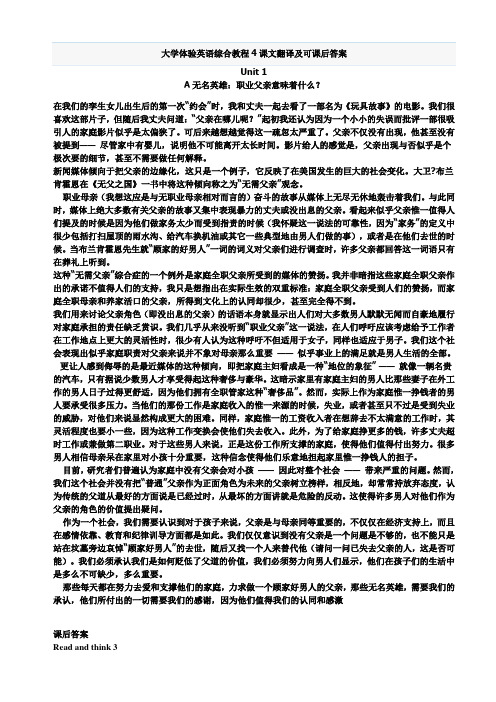
A无名英雄:职业父亲意味着什么?在我们的孪生女儿出生后的第一次“约会”时,我和丈夫一起去看了一部名为《玩具故事》的电影。
我们很喜欢这部片子,但随后我丈夫问道:“父亲在哪儿呢?”起初我还认为因为一个小小的失误而批评一部很吸引人的家庭影片似乎是太偏狭了。
可后来越想越觉得这一疏忽太严重了。
父亲不仅没有出现,他甚至没有被提到——尽管家中有婴儿,说明他不可能离开太长时间。
影片给人的感觉是,父亲出现与否似乎是个极次要的细节,甚至不需要做任何解释。
新闻媒体倾向于把父亲的边缘化,这只是一个例子,它反映了在美国发生的巨大的社会变化。
大卫?布兰肯霍恩在《无父之国》一书中将这种倾向称之为“无需父亲”观念。
职业母亲(我想这应是与无职业母亲相对而言的)奋斗的故事从媒体上无尽无休地轰击着我们。
与此同时,媒体上绝大多数有关父亲的故事又集中表现暴力的丈夫或没出息的父亲。
看起来似乎父亲惟一值得人们提及的时候是因为他们做家务太少而受到指责的时候(我怀疑这一说法的可靠性,因为“家务”的定义中很少包括打扫屋顶的雨水沟、给汽车换机油或其它一些典型地由男人们做的事),或者是在他们去世的时候。
当布兰肯霍恩先生就“顾家的好男人”一词的词义对父亲们进行调查时,许多父亲都回答这一词语只有在葬礼上听到。
这种“无需父亲”综合症的一个例外是家庭全职父亲所受到的媒体的赞扬。
我并非暗指这些家庭全职父亲作出的承诺不值得人们的支持,我只是想指出在实际生效的双重标准:家庭全职父亲受到人们的赞扬,而家庭全职母亲和养家活口的父亲,所得到文化上的认同却很少,甚至完全得不到。
我们用来讨论父亲角色(即没出息的父亲)的话语本身就显示出人们对大多数男人默默无闻而自豪地履行对家庭承担的责任缺乏赏识。
我们几乎从来没听到“职业父亲”这一说法,在人们呼吁应该考虑给予工作者在工作地点上更大的灵活性时,很少有人认为这种呼吁不但适用于女子,同样也适应于男子。
我们这个社会表现出似乎家庭职责对父亲来说并不象对母亲那么重要——似乎事业上的满足就是男人生活的全部。
大学体验英语综合教程4课文翻译
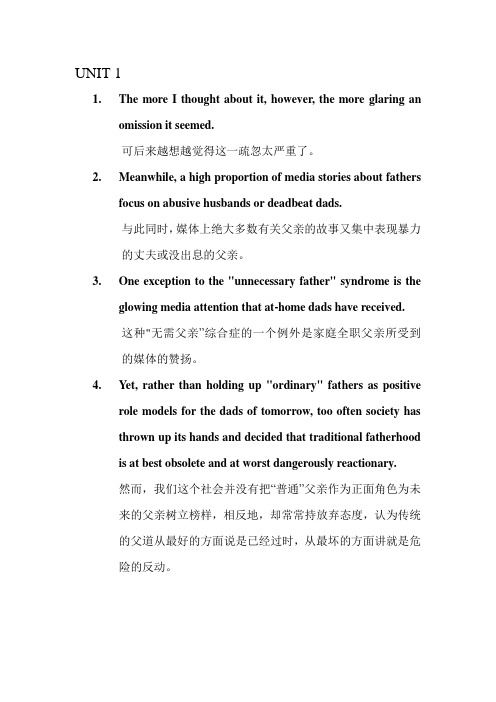
1.The more I thought about it, however, the more glaring anomission it seemed.可后来越想越觉得这一疏忽太严重了。
2.Meanwhile, a high proportion of media stories about fathersfocus on abusive husbands or deadbeat dads.与此同时,媒体上绝大多数有关父亲的故事又集中表现暴力的丈夫或没出息的父亲。
3.One exception to the "unnecessary father" syndrome is theglowing media attention that at-home dads have received.这种"无需父亲”综合症的一个例外是家庭全职父亲所受到的媒体的赞扬。
4.Yet, rather than holding up "ordinary" fathers as positiverole models for the dads of tomorrow, too often society has thrown up its hands and decided that traditional fatherhood is at best obsolete and at worst dangerously reactionary.然而,我们这个社会并没有把“普通”父亲作为正面角色为未来的父亲树立榜样,相反地,却常常持放弃态度,认为传统的父道从最好的方面说是已经过时,从最坏的方面讲就是危险的反动。
1.The truth of the matter is that the Web is no more inherentlydangerous than anything else in the world.其实,万维网并不比世界上其它任何事物更为天然地有害。
大学体验英语综合教程第四册课文翻译及习题答案
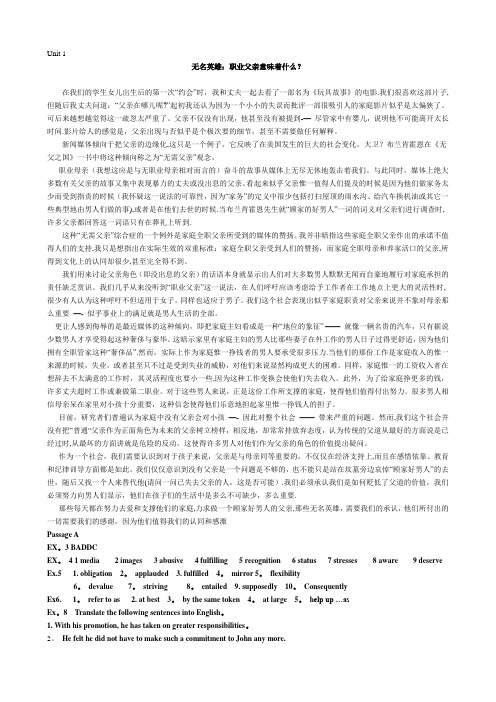
Unit 1无名英雄:职业父亲意味着什么?在我们的孪生女儿出生后的第一次“约会”时,我和丈夫一起去看了一部名为《玩具故事》的电影.我们很喜欢这部片子,但随后我丈夫问道:“父亲在哪儿呢?”起初我还认为因为一个小小的失误而批评一部很吸引人的家庭影片似乎是太偏狭了。
可后来越想越觉得这一疏忽太严重了。
父亲不仅没有出现,他甚至没有被提到-—尽管家中有婴儿,说明他不可能离开太长时间.影片给人的感觉是,父亲出现与否似乎是个极次要的细节,甚至不需要做任何解释。
新闻媒体倾向于把父亲的边缘化,这只是一个例子,它反映了在美国发生的巨大的社会变化。
大卫?布兰肯霍恩在《无父之国》一书中将这种倾向称之为“无需父亲”观念。
职业母亲(我想这应是与无职业母亲相对而言的)奋斗的故事从媒体上无尽无休地轰击着我们。
与此同时,媒体上绝大多数有关父亲的故事又集中表现暴力的丈夫或没出息的父亲。
看起来似乎父亲惟一值得人们提及的时候是因为他们做家务太少而受到指责的时候(我怀疑这一说法的可靠性,因为“家务”的定义中很少包括打扫屋顶的雨水沟、给汽车换机油或其它一些典型地由男人们做的事),或者是在他们去世的时候.当布兰肯霍恩先生就“顾家的好男人”一词的词义对父亲们进行调查时,许多父亲都回答这一词语只有在葬礼上听到.这种“无需父亲”综合症的一个例外是家庭全职父亲所受到的媒体的赞扬。
我并非暗指这些家庭全职父亲作出的承诺不值得人们的支持,我只是想指出在实际生效的双重标准:家庭全职父亲受到人们的赞扬,而家庭全职母亲和养家活口的父亲,所得到文化上的认同却很少,甚至完全得不到。
我们用来讨论父亲角色(即没出息的父亲)的话语本身就显示出人们对大多数男人默默无闻而自豪地履行对家庭承担的责任缺乏赏识。
我们几乎从来没听到“职业父亲”这一说法,在人们呼吁应该考虑给予工作者在工作地点上更大的灵活性时,很少有人认为这种呼吁不但适用于女子,同样也适应于男子。
我们这个社会表现出似乎家庭职责对父亲来说并不象对母亲那么重要—- 似乎事业上的满足就是男人生活的全部。
大学体验英语综合教程4(第三版)课文翻译及课后答案
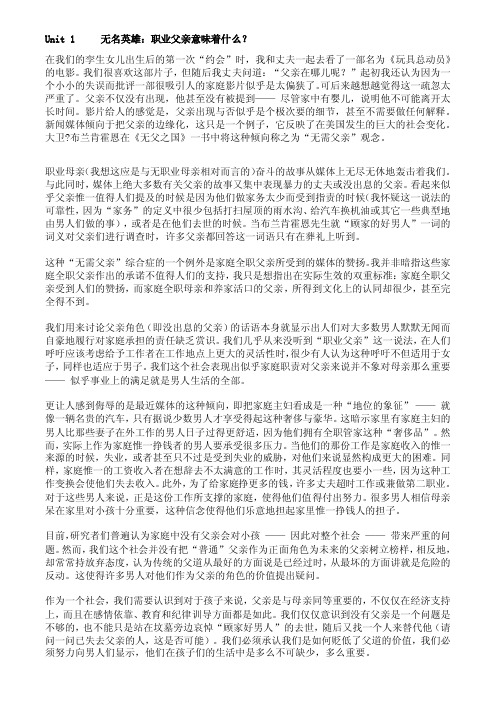
Unit 1 无名英雄:职业父亲意味着什么?在我们的孪生女儿出生后的第一次“约会”时,我和丈夫一起去看了一部名为《玩具总动员》的电影。
我们很喜欢这部片子,但随后我丈夫问道:“父亲在哪儿呢?”起初我还认为因为一个小小的失误而批评一部很吸引人的家庭影片似乎是太偏狭了。
可后来越想越觉得这一疏忽太严重了。
父亲不仅没有出现,他甚至没有被提到——尽管家中有婴儿,说明他不可能离开太长时间。
影片给人的感觉是,父亲出现与否似乎是个极次要的细节,甚至不需要做任何解释。
新闻媒体倾向于把父亲的边缘化,这只是一个例子,它反映了在美国发生的巨大的社会变化。
大卫?布兰肯霍恩在《无父之国》一书中将这种倾向称之为“无需父亲”观念。
职业母亲(我想这应是与无职业母亲相对而言的)奋斗的故事从媒体上无尽无休地轰击着我们。
与此同时,媒体上绝大多数有关父亲的故事又集中表现暴力的丈夫或没出息的父亲。
看起来似乎父亲惟一值得人们提及的时候是因为他们做家务太少而受到指责的时候(我怀疑这一说法的可靠性,因为“家务”的定义中很少包括打扫屋顶的雨水沟、给汽车换机油或其它一些典型地由男人们做的事),或者是在他们去世的时候。
当布兰肯霍恩先生就“顾家的好男人”一词的词义对父亲们进行调查时,许多父亲都回答这一词语只有在葬礼上听到。
这种“无需父亲”综合症的一个例外是家庭全职父亲所受到的媒体的赞扬。
我并非暗指这些家庭全职父亲作出的承诺不值得人们的支持,我只是想指出在实际生效的双重标准:家庭全职父亲受到人们的赞扬,而家庭全职母亲和养家活口的父亲,所得到文化上的认同却很少,甚至完全得不到。
我们用来讨论父亲角色(即没出息的父亲)的话语本身就显示出人们对大多数男人默默无闻而自豪地履行对家庭承担的责任缺乏赏识。
大学体验英语综合教程4第三版课后答案及翻译

Unit 1 无名英雄:职业父亲意味着什么?在我们的孪生女儿出生后的第一次“约会”时,我和丈夫一起去看了一部名为《玩具总动员》的电影。
我们很喜欢这部片子,但随后我丈夫问道:“父亲在哪儿呢?”起初我还认为因为一个小小的失误而批评一部很吸引人的家庭影片似乎是太偏狭了。
可后来越想越觉得这一疏忽太严重了。
父亲不仅没有出现,他甚至没有被提到——尽管家中有婴儿,说明他不可能离开太长时间。
影片给人的感觉是,父亲出现与否似乎是个极次要的细节,甚至不需要做任何解释。
新闻媒体倾向于把父亲的边缘化,这只是一个例子,它反映了在美国发生的巨大的社会变化。
大卫?布兰肯霍恩在《无父之国》一书中将这种倾向称之为“无需父亲”观念。
职业母亲(我想这应是与无职业母亲相对而言的)奋斗的故事从媒体上无尽无休地轰击着我们。
与此同时,媒体上绝大多数有关父亲的故事又集中表现暴力的丈夫或没出息的父亲。
看起来似乎父亲惟一值得人们提及的时候是因为他们做家务太少而受到指责的时候(我怀疑这一说法的可靠性,因为“家务”的定义中很少包括打扫屋顶的雨水沟、给汽车换机油或其它一些典型地由男人们做的事),或者是在他们去世的时候。
当布兰肯霍恩先生就“顾家的好男人”一词的词义对父亲们进行调查时,许多父亲都回答这一词语只有在葬礼上听到。
这种“无需父亲”综合症的一个例外是家庭全职父亲所受到的媒体的赞扬。
我并非暗指这些家庭全职父亲作出的承诺不值得人们的支持,我只是想指出在实际生效的双重标准:家庭全职父亲受到人们的赞扬,而家庭全职母亲和养家活口的父亲,所得到文化上的认同却很少,甚至完全得不到。
我们用来讨论父亲角色(即没出息的父亲)的话语本身就显示出人们对大多数男人默默无闻而自豪地履行对家庭承担的责任缺乏赏识。
我们几乎从来没听到“职业父亲”这一说法,在人们呼吁应该考虑给予工作者在工作地点上更大的灵活性时,很少有人认为这种呼吁不但适用于女子,同样也适应于男子。
我们这个社会表现出似乎家庭职责对父亲来说并不象对母亲那么重要——似乎事业上的满足就是男人生活的全部。
大学体验英语第四册综合教程课文翻译及课后习题答案
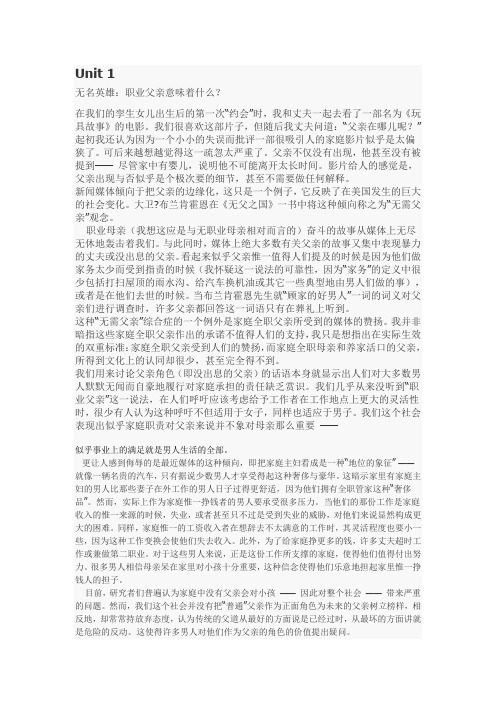
Unit 1无名英雄:职业父亲意味着什么?在我们的孪生女儿出生后的第一次“约会”时,我和丈夫一起去看了一部名为《玩具故事》的电影。
我们很喜欢这部片子,但随后我丈夫问道:“父亲在哪儿呢?”起初我还认为因为一个小小的失误而批评一部很吸引人的家庭影片似乎是太偏狭了。
可后来越想越觉得这一疏忽太严重了。
父亲不仅没有出现,他甚至没有被提到——尽管家中有婴儿,说明他不可能离开太长时间。
影片给人的感觉是,父亲出现与否似乎是个极次要的细节,甚至不需要做任何解释。
新闻媒体倾向于把父亲的边缘化,这只是一个例子,它反映了在美国发生的巨大的社会变化。
大卫?布兰肯霍恩在《无父之国》一书中将这种倾向称之为“无需父亲”观念。
职业母亲(我想这应是与无职业母亲相对而言的)奋斗的故事从媒体上无尽无休地轰击着我们。
与此同时,媒体上绝大多数有关父亲的故事又集中表现暴力的丈夫或没出息的父亲。
看起来似乎父亲惟一值得人们提及的时候是因为他们做家务太少而受到指责的时候(我怀疑这一说法的可靠性,因为“家务”的定义中很少包括打扫屋顶的雨水沟、给汽车换机油或其它一些典型地由男人们做的事),或者是在他们去世的时候。
当布兰肯霍恩先生就“顾家的好男人”一词的词义对父亲们进行调查时,许多父亲都回答这一词语只有在葬礼上听到。
这种“无需父亲”综合症的一个例外是家庭全职父亲所受到的媒体的赞扬。
我并非暗指这些家庭全职父亲作出的承诺不值得人们的支持,我只是想指出在实际生效的双重标准:家庭全职父亲受到人们的赞扬,而家庭全职母亲和养家活口的父亲,所得到文化上的认同却很少,甚至完全得不到。
我们用来讨论父亲角色(即没出息的父亲)的话语本身就显示出人们对大多数男人默默无闻而自豪地履行对家庭承担的责任缺乏赏识。
我们几乎从来没听到“职业父亲”这一说法,在人们呼吁应该考虑给予工作者在工作地点上更大的灵活性时,很少有人认为这种呼吁不但适用于女子,同样也适应于男子。
我们这个社会表现出似乎家庭职责对父亲来说并不象对母亲那么重要——似乎事业上的满足就是男人生活的全部。
大学体验英语综合教程4(第三版)课文翻译
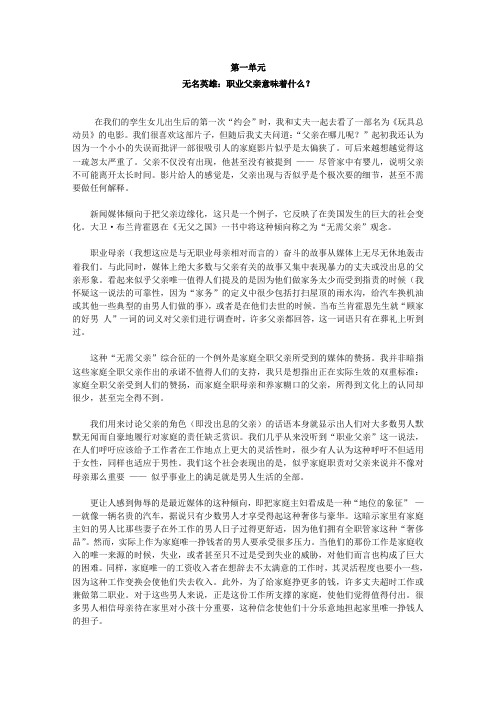
第一单元无名英雄:职业父亲意味着什么?在我们的孪生女儿出生后的第一次“约会”时,我和丈夫一起去看了一部名为《玩具总动员》的电影。
我们很喜欢这部片子,但随后我丈夫问道:“父亲在哪儿呢?”起初我还认为因为一个小小的失误而批评一部很吸引人的家庭影片似乎是太偏狭了。
可后来越想越觉得这一疏忽太严重了。
父亲不仅没有出现,他甚至没有被提到——尽管家中有婴儿,说明父亲不可能离开太长时间。
影片给人的感觉是,父亲出现与否似乎是个极次要的细节,甚至不需要做任何解释。
新闻媒体倾向于把父亲边缘化,这只是一个例子,它反映了在美国发生的巨大的社会变化。
大卫·布兰肯霍恩在《无父之国》一书中将这种倾向称之为“无需父亲”观念。
职业母亲(我想这应是与无职业母亲相对而言的)奋斗的故事从媒体上无尽无休地轰击着我们。
与此同时,媒体上绝大多数与父亲有关的故事又集中表现暴力的丈夫或没出息的父亲形象。
看起来似乎父亲唯一值得人们提及的是因为他们做家务太少而受到指责的时候(我怀疑这一说法的可靠性,因为“家务”的定义中很少包括打扫屋顶的雨水沟,给汽车换机油或其他一些典型的由男人们做的事),或者是在他们去世的时候。
当布兰肯霍恩先生就“顾家的好男人”一词的词义对父亲们进行调查时,许多父亲都回答,这一词语只有在葬礼上听到过。
这种“无需父亲”综合征的一个例外是家庭全职父亲所受到的媒体的赞扬。
我并非暗指这些家庭全职父亲作出的承诺不值得人们的支持,我只是想指出正在实际生效的双重标准:家庭全职父亲受到人们的赞扬,而家庭全职母亲和养家糊口的父亲,所得到文化上的认同却很少,甚至完全得不到。
我们用来讨论父亲的角色(即没出息的父亲)的话语本身就显示出人们对大多数男人默默无闻而自豪地履行对家庭的责任缺乏赏识。
我们几乎从来没听到“职业父亲”这一说法,在人们呼吁应该给予工作者在工作地点上更大的灵活性时,很少有人认为这种呼吁不但适用于女性,同样也适应于男性。
我们这个社会表现出的是,似乎家庭职责对父亲来说并不像对母亲那么重要——似乎事业上的满足就是男人生活的全部。
大学体验英语综合教程4(第三版)课后翻译答案

大学体验英语综合教程4(第三版)课后翻译答案Unit11.随着职务的提升,他担负的责任也更大了。
(take on)With his promotion, he has taken on greater responsibilities.2.他感到没有必要再一次对约翰承担这样的责任了。
(make a commitment) He felt he did not have to make such a commitment to John any more.3.闲暇时玛丽喜欢外出购物,与她相反,露茜却喜欢待在家里看书。
(asopposed to)Mary likes to go shopping in her spare time, as opposed to Lucy, who prefers to stay at home reading.4.说得好听一些,可以说他有抱负,用最糟糕的话来说,他是一个没有良心(conscience) 且没有资格的权力追求者。
(at best, at worst)At best he 's ambitious, and at worst a power-seeker without conscience or qualifications.5.我们已尽全力想说服他,但是却毫无进展。
(strive, make no headway) We have striven to the full to convince him, but we have made no headway.Unit21.宪法规定公民享有言论自由。
(provide for)The Constitution provides for citizen’s freedom of speech.2.我们在如何养育孩子的问题上有截然不同的看法,因此常发生争吵。
(growout of; bring up)Our constant quarrels grew out of the diverse ideas on how to bring up children.3.我们早在会阅读之前就已经掌握了一些词汇。
大学体验英语4课后翻译

大学体验英语4课后翻译第一篇:大学体验英语4课后翻译大学体验英语综合教程4课后翻译1.随着职务的提升,他担负的责任也更大了。
With his promotion, he has taken on greater responsibilities.2.他感到他没有必要再一次对约翰承担这样的责任了。
He felt he did not have to make such a commitment to John any more.3.闲暇时玛丽喜欢外出购物,与她相反,露西却喜欢呆在家里看书。
Mary likes to go shopping in her spare time, as opposed to Lucy, who prefers to stay at home reading.4.说好听一点,可以说他有抱负,用最糟糕的话来说,他是一个没有良心或没有资格的权力追求者。
At best he’s ambitious, and at worst a powe r-seeker without conscience or qualifications.5.我们已经尽全力想说服他,但是却毫无进展。
We have striven to the full to convince him, but we have made no headway.1.要是他适合当校长,那么哪个学生都可以当。
He is no more fit to be a headmaster than any schoolboy would be.2.至于她的父亲,她不敢肯定他是否会接收她和她的小孩。
As for her father, she is not sure whether he will accept her and her baby.3.晚睡会损害健康而早睡早起有益于健康。
Staying up late will undermine one’s health while going to bed early and getting up early will benefit it.4.大使亲自向总理转达了总统的问候。
大学体验英语综合教程4 (第三版) 最新版课文翻译
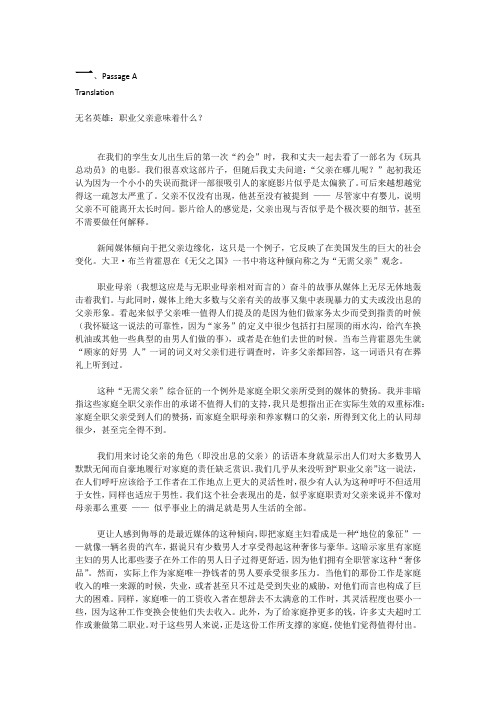
一、Passage ATranslation无名英雄:职业父亲意味着什么?在我们的孪生女儿出生后的第一次“约会”时,我和丈夫一起去看了一部名为《玩具总动员》的电影。
我们很喜欢这部片子,但随后我丈夫问道:“父亲在哪儿呢?”起初我还认为因为一个小小的失误而批评一部很吸引人的家庭影片似乎是太偏狭了。
可后来越想越觉得这一疏忽太严重了。
父亲不仅没有出现,他甚至没有被提到——尽管家中有婴儿,说明父亲不可能离开太长时间。
影片给人的感觉是,父亲出现与否似乎是个极次要的细节,甚至不需要做任何解释。
新闻媒体倾向于把父亲边缘化,这只是一个例子,它反映了在美国发生的巨大的社会变化。
大卫·布兰肯霍恩在《无父之国》一书中将这种倾向称之为“无需父亲”观念。
职业母亲(我想这应是与无职业母亲相对而言的)奋斗的故事从媒体上无尽无休地轰击着我们。
与此同时,媒体上绝大多数与父亲有关的故事又集中表现暴力的丈夫或没出息的父亲形象。
看起来似乎父亲唯一值得人们提及的是因为他们做家务太少而受到指责的时候(我怀疑这一说法的可靠性,因为“家务”的定义中很少包括打扫屋顶的雨水沟,给汽车换机油或其他一些典型的由男人们做的事),或者是在他们去世的时候。
当布兰肯霍恩先生就“顾家的好男人”一词的词义对父亲们进行调查时,许多父亲都回答,这一词语只有在葬礼上听到过。
这种“无需父亲”综合征的一个例外是家庭全职父亲所受到的媒体的赞扬。
我并非暗指这些家庭全职父亲作出的承诺不值得人们的支持,我只是想指出正在实际生效的双重标准:家庭全职父亲受到人们的赞扬,而家庭全职母亲和养家糊口的父亲,所得到文化上的认同却很少,甚至完全得不到。
我们用来讨论父亲的角色(即没出息的父亲)的话语本身就显示出人们对大多数男人默默无闻而自豪地履行对家庭的责任缺乏赏识。
我们几乎从来没听到“职业父亲”这一说法,在人们呼吁应该给予工作者在工作地点上更大的灵活性时,很少有人认为这种呼吁不但适用于女性,同样也适应于男性。
大学体验英语综合教程4课文翻译(双语)

Unit 1The Unsung Heroes: What About Working Dads?On our first "date" after our twin daughters were born, my husband and I went to see the movie Toy Story. We enjoyed it, but afterward my husband asked, "Where was the dad?" At first, it seemed petty to criticize an entertaining family movie because of one small point. The more I thought about it, however, the more glaring an omission it seemed. Not only was dad not around, he wasn't even mentioned — despite the fact that there was a baby in the family, so dad couldn't have been that long gone. It was as if the presence—or absence —of a father is a minor detail, not even requiring an explanation.This is only one example of the media trend toward marginalizing fathers, which mirrors enormous social changes in the United States. David Blankenhorn, in his book Fatherless America, refers to this trend as the "unnecessary father" concept.We are bombarded by stories about the struggles of working mothers (as opposed to non-working mothers, I suppose). Meanwhile, a high proportion of media stories about fathers focus on abusive husbands or deadbeat dads. It seems that the only time fathers merit attention is when they are criticized for not helping enough with the housework (a claim that I find dubious anyway, because the definition of "housework" rarely includes cleaning the gutters, changing the oil in the car or other jobs typically done by men) or when they die. When Mr. Blankenhorn surveyed fathers about the meaning of the term "good family man," many responded that it was a phrase they only heard at funerals.One exception to the "unne cessary father" syndrome is the glowing media attention that at-home dads have received. I do not mean to imply that at-home dads do not deserve support for making this commitment. I only mean to point out the double standard at work when at-home dads are applauded while at-home mothers and breadwinner fathers are given little, if any, cultural recognition.The very language we use to discuss men's roles (i.e., deadbeat dads) shows a lack of appreciation for the majority of men who quietly yet proudly fulfill their family responsibilities. We almost never hear the term "working father," and it is rare that calls for more workplace flexibility are considered to be for men as much as for women. Our society acts as if family obligations are not as important to fathers as they are to mothers — as if career satisfaction is what a man's life is all about. Even more insulting is the recent media trend of regarding at-home wives as "status symbols" —like an expensive car —flaunted by the supposedly few men who can afford such a luxury. The implication is that men with at-home wives have it easier than those whose wives work outside the home because they have the "luxury" of a full-time housekeeper. In reality, however, the men who are the sole wage earners for their families suffera lot of stresses. The loss of a job —or even the threat of that happening — is obviously much more difficult when that job is the sole source of income for a family. By the same token, sole wage earners have less flexibility when it comes to leaving unsatisfying careers because of the loss of income such a job change entails. In addition, many husbands work overtime or second jobs to make more money needed for their families. For these men, it is the family that the job supports that makes it all worthwhile. It is the belief that having a mother at home is important to the children, which makes so many men gladly take on the burden of being a sole wage earner.Today, there is widespread agreement among researchers that the absence of fathers from households causes serious problems for children and, consequently, for society at large. Yet, rather than holding up "ordinary" fathers as positive role models for the dads of tomorrow, too often society has thrown up its hands and decided that traditional fatherhood is at best obsolete and at worst dangerously reactionary. This has left many men questioning the value of their role as fathers.As a society, we need to realize that fathers are just as important to children as mothers are —not only for financial support, but for emotional support, education and discipline as well. It is not enough for us merely to recognize that fatherlessness is a problem —to stand beside the grave and mourn the loss of the "good family man" and then try to find someone to replace him (ask anyone who has lost a father to death if that is possible). We must acknowledge how we have devalued fatherhood and work to show men how necessary, how important they are in their children's lives.那些每天都在努力去爱和支撑他们的家庭,力求做一个顾家好男人的父亲,那些无名英雄,需要我们的承认,他们所付出的一切需要我们的感谢,因为他们值得我们的认同和感激。
大学体验英语综合教程4课文翻译和课后翻译
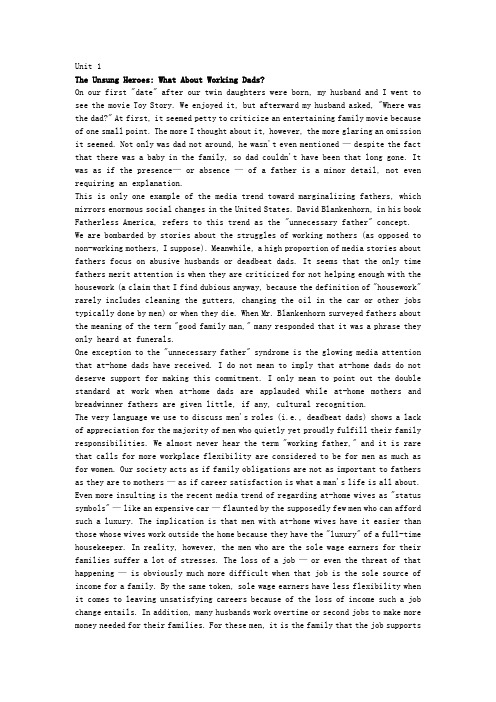
Unit 1The Unsung Heroes: What About Working Dads?On our first "date" after our twin daughters were born, my husband and I went to see the movie Toy Story. We enjoyed it, but afterward my husband asked, "Where was the dad?" At first, it seemed petty to criticize an entertaining family movie because of one small point. The more I thought about it, however, the more glaring an omission it seemed. Not only was dad not around, he wasn't even mentioned —despite the fact that there was a baby in the family, so dad couldn't have been that long gone. It was as if the presence— or absence — of a father is a minor detail, not even requiring an explanation.This is only one example of the media trend toward marginalizing fathers, which mirrors enormous social changes in the United States. David Blankenhorn, in his book Fatherless America, refers to this trend as the "unnecessary father" concept. We are bombarded by stories about the struggles of working mothers (as opposed to non-working mothers, I suppose). Meanwhile, a high proportion of media stories about fathers focus on abusive husbands or deadbeat dads. It seems that the only time fathers merit attention is when they are criticized for not helping enough with the housework (a claim that I find dubious anyway, because the definition of "housework" rarely includes cleaning the gutters, changing the oil in the car or other jobs typically done by men) or when they die. When Mr. Blankenhorn surveyed fathers about the meaning of the term "good family man," many responded that it was a phrase they only heard at funerals.One exception to the "unnecessary father" syndrome is the glowing media attention that at-home dads have received. I do not mean to imply that at-home dads do not deserve support for making this commitment. I only mean to point out the double standard at work when at-home dads are applauded while at-home mothers and breadwinner fathers are given little, if any, cultural recognition.The very language we use to discuss men's roles (i.e., deadbeat dads) shows a lack of appreciation for the majority of men who quietly yet proudly fulfill their family responsibilities. We almost never hear the term "working father," and it is rare that calls for more workplace flexibility are considered to be for men as much as for women. Our society acts as if family obligations are not as important to fathers as they are to mothers —as if career satisfaction is what a man's life is all about. Even more insulting is the recent media trend of regarding at-home wives as "status symbols" —like an expensive car —flaunted by the supposedly few men who can afford such a luxury. The implication is that men with at-home wives have it easier than those whose wives work outside the home because they have the "luxury" of a full-time housekeeper. In reality, however, the men who are the sole wage earners for their families suffer a lot of stresses. The loss of a job — or even the threat of that happening — is obviously much more difficult when that job is the sole source of income for a family. By the same token, sole wage earners have less flexibility when it comes to leaving unsatisfying careers because of the loss of income such a job change entails. In addition, many husbands work overtime or second jobs to make more money needed for their families. For these men, it is the family that the job supportsthat makes it all worthwhile. It is the belief that having a mother at home is important to the children, which makes so many men gladly take on the burden of being a sole wage earner.Today, there is widespread agreement among researchers that the absence of fathers from households causes serious problems for children and, consequently, for society at large. Yet, rather than holding up "ordinary" fathers as positive role models for the dads of tomorrow, too often society has thrown up its hands and decided that traditional fatherhood is at best obsolete and at worst dangerously reactionary. This has left many men questioning the value of their role as fathers.As a society, we need to realize that fathers are just as important to children as mothers are —not only for financial support, but for emotional support, education and discipline as well. It is not enough for us merely to recognize that fatherlessness is a problem — to stand beside the grave and mourn the loss of the "good family man" and then try to find someone to replace him (ask anyone who has lost a father to death if that is possible). We must acknowledge how we have devalued fatherhood and work to show men how necessary, how important they are in their children's lives.Those fathers who strive to be good family men by being there every day to love and support their families —those unsung heroes —need our recognition and our thanks for all they do. Because they deserve it无名英雄:职业父亲意味着什么?在我们的孪生女儿出生后的第一次"约会”时,我和丈夫一起去看了一部名为《玩具故事》的电影。
大学体验英语综合教程4课后翻译完整版
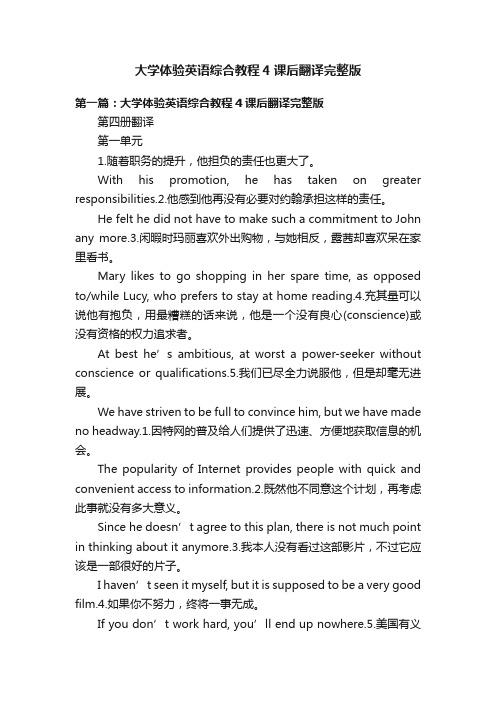
大学体验英语综合教程4课后翻译完整版第一篇:大学体验英语综合教程4课后翻译完整版第四册翻译第一单元1.随着职务的提升,他担负的责任也更大了。
With his promotion, he has taken on greater responsibilities.2.他感到他再没有必要对约翰承担这样的责任。
He felt he did not have to make such a commitment to John any more.3.闲暇时玛丽喜欢外出购物,与她相反,露茜却喜欢呆在家里看书。
Mary likes to go shopping in her spare time, as opposed to/while Lucy, who prefers to stay at home reading.4.充其量可以说他有抱负,用最糟糕的话来说,他是一个没有良心(conscience)或没有资格的权力追求者。
At best he’s ambitiou s, at worst a power-seeker without conscience or qualifications.5.我们已尽全力说服他,但是却毫无进展。
We have striven to be full to convince him, but we have made no headway.1.因特网的普及给人们提供了迅速、方便地获取信息的机会。
The popularity of Internet provides people with quick and convenient access to information.2.既然他不同意这个计划,再考虑此事就没有多大意义。
Since he doesn’t agree to this plan, there is not much point in thinking about it anymore.3.我本人没有看过这部影片,不过它应该是一部很好的片子。
大学体验英语综合教程4PassageA翻译
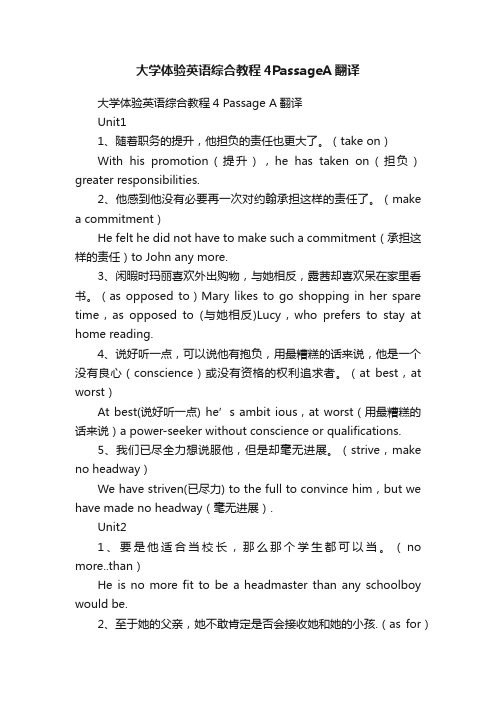
大学体验英语综合教程4PassageA翻译大学体验英语综合教程4 Passage A翻译Unit11、随着职务的提升,他担负的责任也更大了。
(take on)With his promotion(提升),he has taken on(担负)greater responsibilities.2、他感到他没有必要再一次对约翰承担这样的责任了。
(makea commitment)He felt he did not have to make such a commitment(承担这样的责任)to John any more.3、闲暇时玛丽喜欢外出购物,与她相反,露茜却喜欢呆在家里看书。
(as opposed to)Mary likes to go shopping in her spare time,as opposed to (与她相反)Lucy,who prefers to stay at home reading.4、说好听一点,可以说他有抱负,用最糟糕的话来说,他是一个没有良心(conscience)或没有资格的权利追求者。
(at best,at worst)At best(说好听一点) he’s ambit ious,at worst(用最糟糕的话来说)a power-seeker without conscience or qualifications.5、我们已尽全力想说服他,但是却毫无进展。
(strive,make no headway)We have striven(已尽力) to the full to convince him,but we have made no headway(毫无进展).Unit21、要是他适合当校长,那么那个学生都可以当。
(no more..than)He is no more fit to be a headmaster than any schoolboy would be.2、至于她的父亲,她不敢肯定是否会接收她和她的小孩.(as for)As for(至于) her father,she is not sure whether(不敢肯定)he will accept her and her baby.3、晚睡会损害健康而早睡早起有益于健康。
大学体验英语综合教程4课文翻译及答案
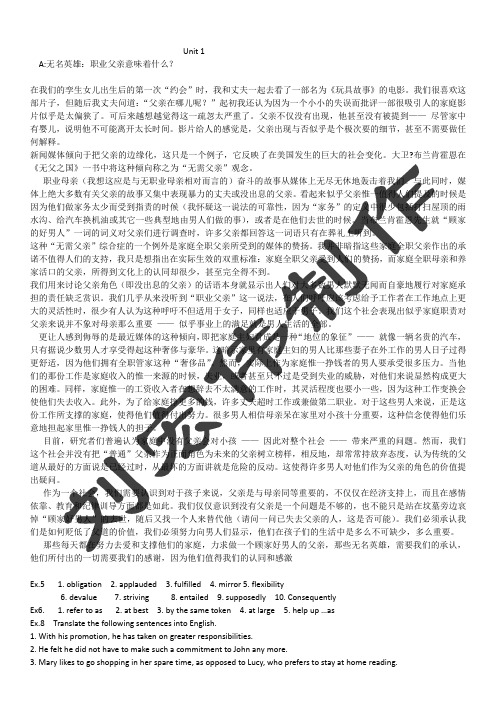
Unit 1A:无名英雄:职业父亲意味着什么?在我们的孪生女儿出生后的第一次“约会”时,我和丈夫一起去看了一部名为《玩具故事》的电影。
我们很喜欢这部片子,但随后我丈夫问道:“父亲在哪儿呢?”起初我还认为因为一个小小的失误而批评一部很吸引人的家庭影片似乎是太偏狭了。
可后来越想越觉得这一疏忽太严重了。
父亲不仅没有出现,他甚至没有被提到——尽管家中有婴儿,说明他不可能离开太长时间。
影片给人的感觉是,父亲出现与否似乎是个极次要的细节,甚至不需要做任何解释。
新闻媒体倾向于把父亲的边缘化,这只是一个例子,它反映了在美国发生的巨大的社会变化。
大卫?布兰肯霍恩在《无父之国》一书中将这种倾向称之为“无需父亲”观念。
职业母亲(我想这应是与无职业母亲相对而言的)奋斗的故事从媒体上无尽无休地轰击着我们。
与此同时,媒体上绝大多数有关父亲的故事又集中表现暴力的丈夫或没出息的父亲。
看起来似乎父亲惟一值得人们提及的时候是因为他们做家务太少而受到指责的时候(我怀疑这一说法的可靠性,因为“家务”的定义中很少包括打扫屋顶的雨水沟、给汽车换机油或其它一些典型地由男人们做的事),或者是在他们去世的时候。
当布兰肯霍恩先生就“顾家的好男人”一词的词义对父亲们进行调查时,许多父亲都回答这一词语只有在葬礼上听到。
这种“无需父亲”综合症的一个例外是家庭全职父亲所受到的媒体的赞扬。
我并非暗指这些家庭全职父亲作出的承诺不值得人们的支持,我只是想指出在实际生效的双重标准:家庭全职父亲受到人们的赞扬,而家庭全职母亲和养家活口的父亲,所得到文化上的认同却很少,甚至完全得不到。
我们用来讨论父亲角色(即没出息的父亲)的话语本身就显示出人们对大多数男人默默无闻而自豪地履行对家庭承担的责任缺乏赏识。
我们几乎从来没听到“职业父亲”这一说法,在人们呼吁应该考虑给予工作者在工作地点上更大的灵活性时,很少有人认为这种呼吁不但适用于女子,同样也适应于男子。
我们这个社会表现出似乎家庭职责对父亲来说并不象对母亲那么重要——似乎事业上的满足就是男人生活的全部。
大学体验英语综合教程4课文翻译和课后翻译

Unit 1The Unsung Heroes: What About Working Dads?On our first "date" after our twin daughters were born, my husband and I went to see the movie Toy Story. We enjoyed it, but afterward my husband asked, "Where was the dad?" At first, it seemed petty to criticize an entertaining family movie because of one small point. The more I thought about it, however, the more glaring an omission it seemed. Not only was dad not around, he wasn't even mentioned —despite the fact that there was a baby in the family, so dad couldn't have been that long gone. It was as if the presence— or absence — of a father is a minor detail, not even requiring an explanation.This is only one example of the media trend toward marginalizing fathers, which mirrors enormous social changes in the United States. David Blankenhorn, in his book Fatherless America, refers to this trend as the "unnecessary father" concept. We are bombarded by stories about the struggles of working mothers (as opposed to non-working mothers, I suppose). Meanwhile, a high proportion of media stories about fathers focus on abusive husbands or deadbeat dads. It seems that the only time fathers merit attention is when they are criticized for not helping enough with the housework (a claim that I find dubious anyway, because the definition of "housework" rarely includes cleaning the gutters, changing the oil in the car or other jobs typically done by men) or when they die. When Mr. Blankenhorn surveyed fathers about the meaning of the term "good family man," many responded that it was a phrase they only heard at funerals.One exception to the "unnecessary father" syndrome is the glowing media attention that at-home dads have received. I do not mean to imply that at-home dads do not deserve support for making this commitment. I only mean to point out the double standard at work when at-home dads are applauded while at-home mothers and breadwinner fathers are given little, if any, cultural recognition.The very language we use to discuss men's roles (i.e., deadbeat dads) shows a lack of appreciation for the majority of men who quietly yet proudly fulfill their family responsibilities. We almost never hear the term "working father," and it is rare that calls for more workplace flexibility are considered to be for men as much as for women. Our society acts as if family obligations are not as important to fathers as they are to mothers —as if career satisfaction is what a man's life is all about. Even more insulting is the recent media trend of regarding at-home wives as "status symbols" —like an expensive car —flaunted by the supposedly few men who can afford such a luxury. The implication is that men with at-home wives have it easier than those whose wives work outside the home because they have the "luxury" of a full-time housekeeper. In reality, however, the men who are the sole wage earners for their families suffer a lot of stresses. The loss of a job — or even the threat of that happening — is obviously much more difficult when that job is the sole source of income for a family. By the same token, sole wage earners have less flexibility when it comes to leaving unsatisfying careers because of the loss of income such a job change entails. In addition, many husbands work overtime or second jobs to make more money needed for their families. For these men, it is the family that the job supportsthat makes it all worthwhile. It is the belief that having a mother at home is important to the children, which makes so many men gladly take on the burden of being a sole wage earner.Today, there is widespread agreement among researchers that the absence of fathers from households causes serious problems for children and, consequently, for society at large. Yet, rather than holding up "ordinary" fathers as positive role models for the dads of tomorrow, too often society has thrown up its hands and decided that traditional fatherhood is at best obsolete and at worst dangerously reactionary. This has left many men questioning the value of their role as fathers.As a society, we need to realize that fathers are just as important to children as mothers are —not only for financial support, but for emotional support, education and discipline as well. It is not enough for us merely to recognize that fatherlessness is a problem — to stand beside the grave and mourn the loss of the "good family man" and then try to find someone to replace him (ask anyone who has lost a father to death if that is possible). We must acknowledge how we have devalued fatherhood and work to show men how necessary, how important they are in their children's lives.Those fathers who strive to be good family men by being there every day to love and support their families —those unsung heroes —need our recognition and our thanks for all they do. Because they deserve it无名英雄:职业父亲意味着什么?在我们的孪生女儿出生后的第一次"约会”时,我和丈夫一起去看了一部名为《玩具故事》的电影。
- 1、下载文档前请自行甄别文档内容的完整性,平台不提供额外的编辑、内容补充、找答案等附加服务。
- 2、"仅部分预览"的文档,不可在线预览部分如存在完整性等问题,可反馈申请退款(可完整预览的文档不适用该条件!)。
- 3、如文档侵犯您的权益,请联系客服反馈,我们会尽快为您处理(人工客服工作时间:9:00-18:30)。
一、Passage ATranslation无名英雄:职业父亲意味着什么?在我们的孪生女儿出生后的第一次“约会”时,我和丈夫一起去看了一部名为《玩具总动员》的电影。
我们很喜欢这部片子,但随后我丈夫问道:“父亲在哪儿呢?”起初我还认为因为一个小小的失误而批评一部很吸引人的家庭影片似乎是太偏狭了。
可后来越想越觉得这一疏忽太严重了。
父亲不仅没有出现,他甚至没有被提到——尽管家中有婴儿,说明父亲不可能离开太长时间。
影片给人的感觉是,父亲出现与否似乎是个极次要的细节,甚至不需要做任何解释。
新闻媒体倾向于把父亲边缘化,这只是一个例子,它反映了在美国发生的巨大的社会变化。
大卫·布兰肯霍恩在《无父之国》一书中将这种倾向称之为“无需父亲”观念。
职业母亲(我想这应是与无职业母亲相对而言的)奋斗的故事从媒体上无尽无休地轰击着我们。
与此同时,媒体上绝大多数与父亲有关的故事又集中表现暴力的丈夫或没出息的父亲形象。
看起来似乎父亲唯一值得人们提及的是因为他们做家务太少而受到指责的时候(我怀疑这一说法的可靠性,因为“家务”的定义中很少包括打扫屋顶的雨水沟,给汽车换机油或其他一些典型的由男人们做的事),或者是在他们去世的时候。
当布兰肯霍恩先生就“顾家的好男人”一词的词义对父亲们进行调查时,许多父亲都回答,这一词语只有在葬礼上听到过。
这种“无需父亲”综合征的一个例外是家庭全职父亲所受到的媒体的赞扬。
我并非暗指这些家庭全职父亲作出的承诺不值得人们的支持,我只是想指出正在实际生效的双重标准:家庭全职父亲受到人们的赞扬,而家庭全职母亲和养家糊口的父亲,所得到文化上的认同却很少,甚至完全得不到。
我们用来讨论父亲的角色(即没出息的父亲)的话语本身就显示出人们对大多数男人默默无闻而自豪地履行对家庭的责任缺乏赏识。
我们几乎从来没听到“职业父亲”这一说法,在人们呼吁应该给予工作者在工作地点上更大的灵活性时,很少有人认为这种呼吁不但适用于女性,同样也适应于男性。
我们这个社会表现出的是,似乎家庭职责对父亲来说并不像对母亲那么重要——似乎事业上的满足就是男人生活的全部。
更让人感到侮辱的是最近媒体的这种倾向,即把家庭主妇看成是一种“地位的象征”——就像一辆名贵的汽车,据说只有少数男人才享受得起这种奢侈与豪华。
这暗示家里有家庭主妇的男人比那些妻子在外工作的男人日子过得更舒适,因为他们拥有全职管家这种“奢侈品”。
然而,实际上作为家庭唯一挣钱者的男人要承受很多压力。
当他们的那份工作是家庭收入的唯一来源的时候,失业,或者甚至只不过是受到失业的威胁,对他们而言也构成了巨大的困难。
同样,家庭唯一的工资收入者在想辞去不太满意的工作时,其灵活程度也要小一些,因为这种工作变换会使他们失去收入。
此外,为了给家庭挣更多的钱,许多丈夫超时工作或兼做第二职业。
对于这些男人来说,正是这份工作所支撑的家庭,使他们觉得值得付出。
很多男人相信母亲待在家里对小孩十分重要,这种信念使他们十分乐意地担起家里唯一挣钱人的担子。
目前,研究者们普遍认为家庭中没有父亲会对小孩——继而也对整个社会——带来严重的问题。
然而,我们这个社会并没有把“普通”父亲作为正面角色为未来的父亲树立榜样,相反地,却常常持放弃态度,认为传统的父道从最好的方面说已经过时,从最坏的方面讲就是危险的反动。
这使许多男人对他们作为父亲的角色的价值提出质疑。
作为一个社会,我们需要认识到,对于孩子来说,父亲是与母亲同等重要的,不仅仅在经济支持上,而且在感情依靠、教育和纪律训导方面都是如此。
我们仅仅意识到没有父亲是一个问题是不够的,不能只是站在坟墓旁边哀悼“顾家好男人”的去世,随后又找一个人来替代他(请问一问已失去父亲的人,这是否可能)。
我们必须承认自己是如何贬低了父道的价值,我们必须努力向男人们证明,他们在孩子们的生活中是多么不可缺少,多么重要。
那些每天都在努力去爱和支撑他们的家庭,力求做一个顾家好男人的父亲们,那些无名英雄,需要我们的承认,他们所付出的一切需要我们的感谢,因为他们值得我们的认同。
二、Passage ATranslation颐养天年人人都知道孤儿院和养老院绝不能替代家庭。
人们的感觉是只有家庭才能给老人与幼童提供使他们会产生满足感的一切。
对子女来说,享有父母的呵护毋庸多说,因为这是一种本能的父辈的情感。
不过晚辈对于长辈的孝敬,正如中国的一句俗话“水往低处流”所说,则需要由文化去培养。
一个自然人必会爱其子女,但只有受过文化教育的人才会珍爱和孝敬父母。
这个爱老、敬老的原则最终成为了大众所信守的准则,并且根据某些著书立说者所言,在父母年老时能有幸在其身边服侍,实际上已成为一种强烈的愿望。
父母生病了却没有机会在病榻前亲侍药汤,亡故时未能亲临送终,已被有文化的中国人视为终身最大的遗憾。
官员到了五六十岁尚不能迎养父母,于官署中晨昏定省,会被视为道德缺失而倍感羞愧,不得不常向亲友和同僚解释他不能迎养孝敬的理由。
从前有个人,因赶回家时父母已亡故,悲痛之下说了这样两句话:“树欲静而风不止,子欲养而亲不在。
”在美国,身体健康且精神矍铄的老年人常对人说他尚“年轻”,或者是旁人说他们“年轻”,而实际上则是说他们身体康健。
这似乎是一种语言上的不幸。
老来健康或者说“长寿康健”是人生莫大的幸运,而改称之为“健康且年轻”,则会贬损其魅力,使原本很完美的东西变得不那么完美了。
终究,世上再也没有什么能比一个健康而智慧的老者更完美的了。
他有着“红润的面庞,雪白的头发”,用和蔼的声音,谈论着人生世故。
中国人很明白这一点,所以画出来的老翁总是“红颊白须”,视之为尘世终极快乐的象征。
美国人大概也看到过中国人所画的老寿星,他那高突的前额、红润的面庞、雪白的长须,还有他笑容可掬的神态!这是何等生动的画像。
他手抚飘逸垂胸的长须,悠然自得。
他何等的庄严,令人起敬;他何等的自信,没有人会质疑他的智慧;他何等的仁慈,因为他见闻了太多的人间疾苦。
对于富有生气的老者,我们也会给予赞誉,说他们是“老当益壮”。
我丝毫不怀疑,美国的老人依旧要坚持说他们又忙碌又活跃这一事实,可以归为个人主义被推崇到了愚蠢的地步。
他们以自主为荣,崇尚自立,耻于依赖子女。
美国人在其宪法中规定了许多人权,但他们却很奇怪地忘掉了老年人应享受子女赡养这一权利,因为这也是因提供养育服务而产生的权利和义务。
有谁能够否认,父母年轻时为子女何等地辛劳,子女小有病痛必彻夜不眠地照顾,在子女还没有学会说话时给他们换洗尿布,耗费二十余载将他们养育成人,教会他们自立生活。
当他们年老时,就有权得到子女的赡养和孝敬。
在普通的家庭生活模式中能否忘掉个人的自立及其自尊?凡是人都是先由父母养育,后来再养育自己的子女,最后则理所当然地得到子女的赡养。
中国人对生活的完整理念是以家庭中的互帮互助为基础的,所以没有个人独立的意识,因此,到了夕阳红的老年时期得到子女赡养时就不会有耻辱感,反而会因有子女赡养而倍感欣幸。
三、Passage AReference Translation网络版权执法——赚钱之道丹佛——布莱恩•希尔,一位北卡罗来纳州20岁的博主,去年12月在他自己的博客上发布了一张机场保安人员搜身的照片,没想到由此引来了一场法律战。
一个月后,希尔先生收到一封电子邮件,发件人是《拉斯维加斯太阳报》的一位记者,他正在调查一家专为报社代理版权诉讼的内华达公司。
电子邮件通知希尔先生,他也是Righthaven公司起诉的对象之一。
尽管那张机场照片在希尔先生从网上撤下之前就早已在网上疯传,但这张照片却是《丹佛邮报》11月18日首次刊发的。
希尔先生撤下了照片,但为时已晚。
法院的传票送到了他的家里。
该诉讼要求法律赔偿。
尽管没有提出赔偿的具体数字,但希尔先生被控“故意”侵权,根据联邦版权法,在这种情况下诉讼方可获得高达15 000美元的赔偿。
“我很震惊,”希尔先生说。
“我想,也许这是一个玩笑或者只是用来吓唬我的。
我真不知道那张照片是受版权保护的。
”在过去一年,各大报纸一直在想方设法保护它们投放在网上的信息内容。
Righthaven公司在科罗拉多和内华达州针对未经《丹佛邮报》或《拉斯维加斯评论期刊》的授权直接在网上转贴的资料所提起的类似的联邦诉讼就超过了200起。
旗下拥有《丹佛邮报》的新闻媒体集团的副总裁莎拉•格兰斯在一封电子邮件中说,搜身的照片已在300多个网站上转载使用,而这些网站均未注明照片版权属于《邮报》或其摄影师。
《评论期刊》的投资人兼斯蒂芬斯媒体的法律总顾问马克•西纽贝尔赞同格兰斯的观点,说剪贴文章就是“窃取我们所编辑材料的潜在读者和网络流量。
”然而,一些批评家却争辩说,Righthaven公司的做法过于严厉,他们希望在人们还没有搞清楚是否违反了联邦版权法之前就速战速决。
通常情况下,他们不会对当事人进行警示就提起诉讼。
Righthaven公司很少预先发出通知,要求网站撤下不属于自己的信息资料,而是直接索要赔偿,并要求取消该网站域名。
根据一些对此类案件兴趣日益浓厚的互联网法律专家的观察,这种行径十分简单:Righthaven公司搜寻在网络上转贴的报刊材料,通常是一篇文章、摘录或是一幅照片,再去获取版权,然后由公司就提起诉讼。
圣克拉拉大学法学院高科技法律研究所主任埃里克•戈德曼说,在网上重新粘贴已发布的材料,如果未减少其原有市场价值,就适用“公平使用”的原则。
关注该诉讼的其他评论家也认为,出于讨论的目的而重新粘贴的资料不构成侵权。
“许多被告对版权法知之甚少”,戈德曼先生说。
“他们不是要与报纸竞争,而仅仅是不知道有关规定。
”戈德曼先生曾向被Righthaven公司起诉的公司非正式地建议庭外和解。
“没有人真的相信从未在任何地方发表过任何东西的Righthaven公司取得了其诉讼文章的全部所有权,”兰达扎先生这样写道。
他的法律小组最近提出动议,驳回Righthaven公司的其他两起案件,并指控该公司涉嫌版权索赔欺诈。
吉布森先生否认他们诉讼的特定目标是不知情的博主并提到对德拉吉先生的诉讼。
Righthaven公司指控“德拉吉报导网站”未经允许贴出了机场保安搜身的照片。
吉布森先生说诉讼最后达成庭外和解。
“不管是粘贴显示在还是上,转移网站受众的危害已经形成,”他说。
“如果指控成立,说我们纯粹是一家贪婪的公司,而不是在推动版权法权益,那我们就不会处置网站受众转移的问题。
”格兰斯女士说,新闻媒体集团“审查过每一个违规事件,但只核准那些针对刊登广告而非从事慈善活动的网站提起的诉讼。
”希尔先生患有自闭症和糖尿病,和母亲靠残疾救助生活。
他说Righthaven公司曾一度提出只需赔偿6 000美元,但遭到他的拒绝。
科罗拉多州的一位律师大卫•科尔一直在为他进行无偿辩护。
一位主持该案件的联邦法官上个月批评Righthaven公司利用法庭与那些担心诉讼费用可能高昂的被告达成和解。
